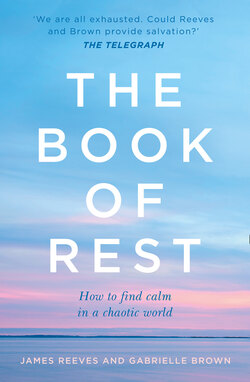Читать книгу The Book of Rest - James Reeves - Страница 22
Why we must stop trying to make ourselves restful
ОглавлениеRest enables us to connect more readily with the constant sense of OK-ness that is the backdrop of all experience, but we cannot enter rest with any conditions. As soon as we apply goals to rest, we turn it into a task, and it is no longer rest. For this reason, we must let go of any preconceived ideas we have about what rest is and what it should look like.
You have an opportunity here to surrender to the freedom that comes from not having to know how any of this works. You do not need to be an expert in meditation or an experienced yogi to ‘do’ anything we are sharing in this book – the point is: you need to do nothing.
And perhaps the greatest challenge of all will be to accept that this journey is not about helping yourself but about coming to the realisation that in spite of everything – all the suffering, all the stress, all the chaos, all the excitement, disappointments celebrations and grief – you exist from a place of constant, unshakable wholeness. There is part of you that doesn’t need any help at all, ever.
— If you’d only stop looking, you’d see there is something fundamentally right with you.
So, here we have yet another apparent contradiction: we want to emphasise that this is not a self-help book in its traditional form, yet we hope that this book will help you to see that part of you that needs no help. It is not a practical guide to positive thinking, a step-by-step route to achieving happiness, a collection of motivational mantras, a roadmap to realising your potential. But this is a self-help book in that it very much requires you to take on the idea that you are your best helper, and then see that it’s not so much help that you need, but awareness, and then ultimately. . . that you are awareness.
But that’s for you to find out, perhaps at the end of this journey.
The concept of helping yourself, or improving yourself, or bettering yourself (however you wish to label such a task) suggests you are somehow lacking. That you just need to do X, Y and Z, and bingo! New you. Whether that’s a thinner, less anxious, better focused, more positive, less stress-heady version of yourself, most self-help books start with the assertion that you are not already OK. We, however, are suggesting that you are already OK, and that it might be that the very notion that you must do something to help you feel OK that is stopping you from feeling OK.
Again, we urge you to stop. Stop trying to help yourself. Or at the very least, take a rest from it.
ASK YOURSELF…
Do you ‘do’ anything in an attempt to feel more rested? Can you see any contraction in what you are doing? What leaves you feeling most rested?
Enquiry 2:
Why do you want to rest?
We so often fixate on what we want, and yet we so rarely ask ourselves why.
You might see how your answers are in conflict with the very nature of rest (and you might not).
Who’s going to benefit from this rest? How? Does it matter if no one benefits? What is the point?
Is it OK to do something that is completely pointless?
Can anything be truly pointless?
There are endless paradoxes around the subject of rest. We can’t do it, but we have to do it. We can’t make ourselves do it, but it must be done. We cannot have the intention of it doing anything for us, but it will do everything for us. We cannot think our way into it, but by thinking about it when we are not doing it, we will become better at not-thinking our way into it.
But is this really that different from anything else? We learn to write not by reading but by writing; we learn to walk by walking, we learn to drive by driving, we learn to swim by swimming, we learn to love by loving. It is in the doing that we do, and the being that we are.
— Regardless of what you think you want, if you allow it, the rest will come, and the rest is easy.
- Prepare yourself for rest. You might want sit, lie down, or you might want to stand and stare into space. Do whatever appeals. (You might also want to revisit Enquiry 1 on page 15)
- As you settle, you might notice your mind is racing. That’s OK. Don’t try to change anything. Stay with this for a few moments
- Now ask yourself what you hope to get out of all this – this resting, this stopping. What’s driving you?
- Whatever your answer, now reflect on the possibility that restfulness is a quality within; not something to create but something to be recovered (or uncovered)
- What does this mean in terms of your motives for seeking out rest? Can you see any contradictions? It doesn’t matter if you did (you cannot be ‘wrong’). See if you can observe without criticism
- Continue to be still for a few moments, or minutes if time allows
- When you’re ready to end the enquiry, have a stretch or take a deep breath
- As you consciously come out of rest, notice how you feel, and note any insights or important new understandings
- Take a moment to write down your reasons for rest. Reflect on them, read them back to yourself (put them on the fridge or on a sticky note)
- Remind yourself that whatever you thought, felt or experienced during this enquiry, was exactly as it should be
